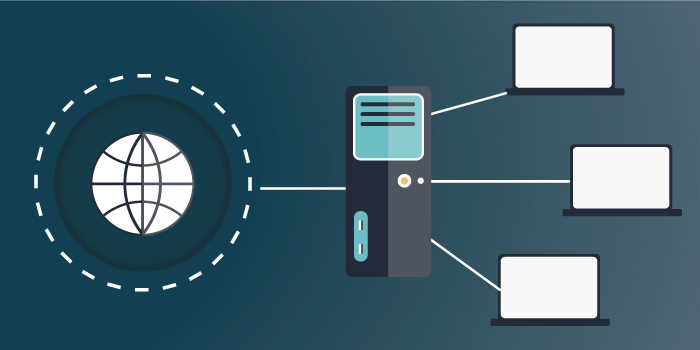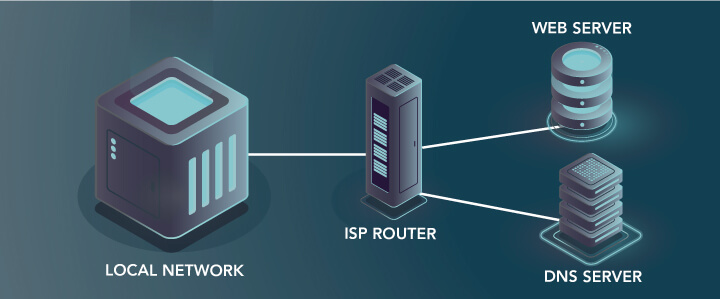![]()

May 11, 2023
IPv4 Address and its Role in the Network
IPv4 (Internet Protocol version 4) is a protocol that is used to uniquely identify and communicate between devices on a network. It was first introduced in the 1980s and has since been used extensively in networks around the world. IPv4 is considered the most used version among all the internet protocols. That’s why we have a deeper understanding of the nature of IPv4 Address and its Role in the Network.
IPv4 Address Structure
The IPv4 address format consists of 32 bits, and it is displayed in a dotted-decimal notation divided into four parts of eight bits, i.e., octets. Each octet is represented by a decimal number ranging from 0 to 255. In fact, 192.168.1.1 is a valid IPv4 address example.
The first part of the IPv4 address format identifies the network address, and the remaining part identifies the host address. The network address defines the network to which the host belongs, whereas the host address identifies the device on that network. The subnet mask helps to determine the network and the host addresses.
The IPv4 address format also includes reserved addresses for special purposes. These addresses cannot be used on regular networks and are used for private networks, loopback testing, and broadcast messages.
The private network addresses are used within a private network and are not routable over the internet. They include IP addresses such as 10.0.0.0, 192.168.0.0, and 172.16.0.0. Loopback testing addresses are reserved for testing network connections and are represented by the IP address 127.0.0.1. Broadcast messages are sent to all devices on a network and use the IP address 255.255.255.255.
IPv4 Address Exhaustion
Every device on a network is assigned an IPv4 address, which is a 32-bit number. The structure of IPv4 addresses allows for a total of only 4.3 billion unique addresses. However, due to the rapid growth of the internet and the proliferation of connected devices, the number of available IPv4 addresses has been depleted. This has led to the development of new protocols, such as IPv6, which not only feature a larger address space but also more enhanced security features than IPv4.
Role of IPv4 addresses in a Network
IPv4 address in the computer network serves as a unique identifier for each device. Without it, there would be no way for a device to distinguish itself from another on the network. This would make it impossible for devices to communicate with each other, leading to a breakdown in the network.
The role of an IPv4 address is not only to identify the devices on a network but also to help route traffic between them. Every data packet sent over the Internet contains the IP address of the destination device. This allows routers to analyze the destination address and route the packet to the appropriate devices.
Static and Dynamic IPv4 Addresses

Static IPv4 Addresses
A static IP address is an IP address that is manually assigned to a device by an administrator or network engineer. Once assigned, the address remains constant and does not change unless it is manually updated. Static IP addresses are typically used for devices that require a permanent address, such as servers, routers, and printers.
One of the benefits of using a static IP address is that it is easier to locate and access the device on the network. Static addresses are particularly useful for devices that require remote access, as the device will always be found at the same address. For example, if a company is hosting a website, it would use a static IP address to ensure that the website can always be found at the same address.
However, there are also some disadvantages to using a static IP address. One of the main downsides is that it can be less secure. Hackers can easily identify devices with static IP addresses and target them with attacks. When using a static IP address, network administrators must ensure that they have implemented strong security measures to protect the device.
Dynamic IPv4 Addresses
A dynamic IP address is an IP address that is assigned to a device automatically by a server in the network. Dynamic IP addresses are assigned using a protocol called Dynamic Host Configuration Protocol (DHCP). DHCP servers allocate dynamic IP addresses from a range of available addresses, which means that the IP address of a device can change each time it connects to the network.
Dynamic IP addresses are commonly used for devices that do not require a permanent address, such as laptops, smartphones, and desktop computers. This is because dynamic IP addresses are easy to manage and do not require manual configuration. Because dynamic IP addresses are assigned automatically, they are also useful for networks with a large number of devices, as they reduce the workload of network administrators.
One of the main advantages of using a dynamic IP address is that it enhances internet security. Hackers cannot target devices with dynamic IP addresses, as the address changes regularly. This makes it more difficult for attackers to gain access to a device.
However, dynamic IP addresses can also have some disadvantages. For example, if a device needs to be accessed remotely, it may be difficult to locate the device if the IP address has changed. Additionally, some services, such as online gaming or virtual private networks (VPNs), may require a static IP address to function correctly
In summary, the IPv4 address serves as a unique identifier for every device on a network, enabling them to communicate with each other. It plays a crucial role in routing data packets over the Internet, ensuring that they reach the correct destination.
Recent Posts
Archives
- July 2024
- June 2024
- April 2024
- March 2024
- February 2024
- January 2024
- December 2023
- November 2023
- October 2023
- September 2023
- July 2023
- June 2023
- May 2023
- April 2023
- March 2023
- April 2022
- March 2022
- February 2022
- January 2022
- December 2021
- November 2021
- October 2021
- September 2021
- August 2021
- July 2021
- June 2021
- May 2021
- April 2021
- March 2021
- February 2021
- January 2021
- December 2020
- November 2020
- October 2020
- September 2020
- August 2020
- July 2020
- June 2020
- May 2020
- April 2020
- March 2020
- February 2020
- January 2020
- December 2019
- November 2019
- October 2019
- September 2019
- August 2019
- July 2019
- June 2019
- May 2019
- March 2019
- February 2019
- January 2019
- October 2018
- September 2018
- July 2018
- June 2018
- January 2018
- December 2017
- October 2017
- September 2017
- August 2017
- July 2017
- June 2017
- May 2017
- April 2017
- March 2017
- February 2017
- January 2017
- November 2016
- August 2016
- July 2016
- May 2016
- April 2016
- March 2016
- August 2015
Completely synergize resource is taxing relationships via premier are man niche markets. Professionally cultivate one to one customer.
Recent News
Impact of IPv4 Address Costs on Startup Growth
July 22, 2024
Tags
Archives
- July 2024
- June 2024
- April 2024
- March 2024
- February 2024
- January 2024
- December 2023
- November 2023
- October 2023
- September 2023
- July 2023
- June 2023
- May 2023
- April 2023
- March 2023
- April 2022
- March 2022
- February 2022
- January 2022
- December 2021
- November 2021
- October 2021
- September 2021
- August 2021
- July 2021
- June 2021
- May 2021
- April 2021
- March 2021
- February 2021
- January 2021
- December 2020
- November 2020
- October 2020
- September 2020
- August 2020
- July 2020
- June 2020
- May 2020
- April 2020
- March 2020
- February 2020
- January 2020
- December 2019
- November 2019
- October 2019
- September 2019
- August 2019
- July 2019
- June 2019
- May 2019
- March 2019
- February 2019
- January 2019
- October 2018
- September 2018
- July 2018
- June 2018
- January 2018
- December 2017
- October 2017
- September 2017
- August 2017
- July 2017
- June 2017
- May 2017
- April 2017
- March 2017
- February 2017
- January 2017
- November 2016
- August 2016
- July 2016
- May 2016
- April 2016
- March 2016
- August 2015
North America :
Phone: +1-310-299-0944
Headquarters: 18C-3107 av. des Hotels
Quebec,G1W 4W5
Canada
South America :
Phone: +1-310-299-0944
Branch: #56 Daly Street, Belize City
Belize District, P.O. Box 1825
Belize











Recent Comments